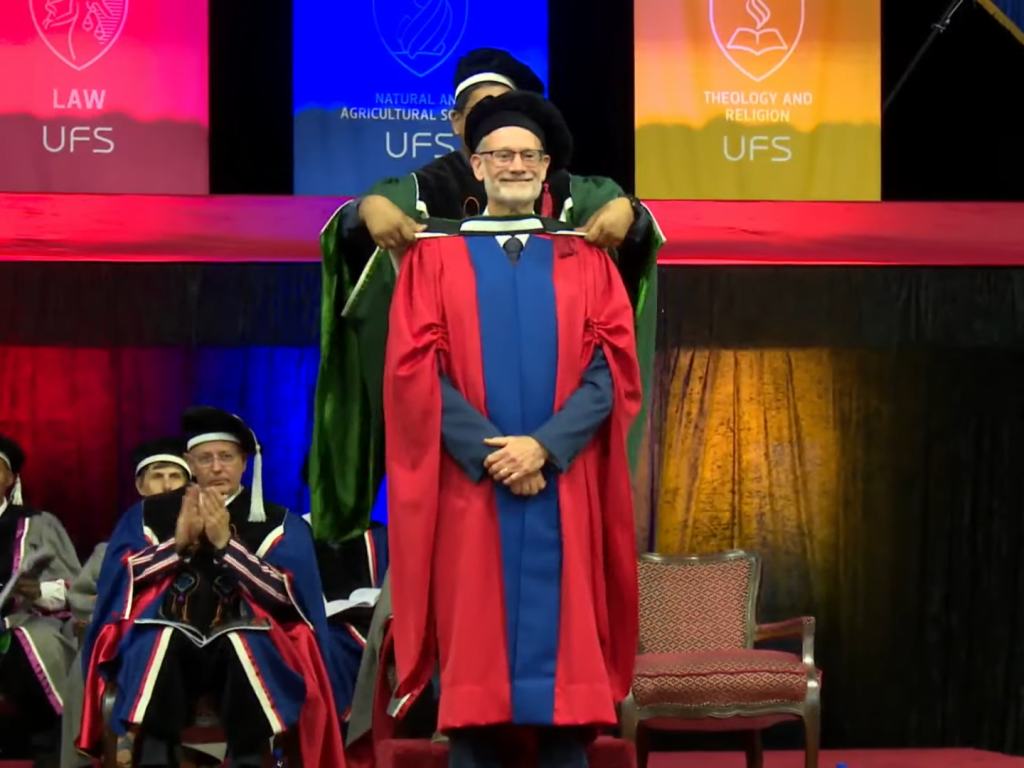“We roll up our sleeves and we do our work for a better country”

To individuals and organisations with an interest in Africa’s transformation towards a prosperous continent where no-one is left behind by poverty, deprivation, and the underlying inequalities that drive these, Murray Leibbrandt would be a familiar name. His research career has spanned decades of exceptional dedication to using his scholarly expertise to support government decision makers making sense of the intricacies and complexities of poverty and inequality.
“We academics in South Africa have the wonderful privilege of working very closely to the policy community – far closer than what very famous professors do in other countries”, Prof. Leibbrandt told the graduation ceremony as he accepted an honorary Doctor of Philosophy in Economic and Management Sciences from the University of the Free State.
“We are called to be an engaged and contributing part of our country and that's an extraordinary privilege; especially for me, who somehow from my earliest days have found a wonderful meshing of my academic work with what I wanted to do with my life. So, I'm deeply grateful.”
Prof. Leibbrandt, who is UCT’s Research Chair in Poverty and Inequality Research, is currently not only the director of ACEIR, one of the centres of excellence of the African Research Universities Alliance, but also the co-lead of the newly established Cluster of Research Excellence in Inequalities, Poverty, and Deprivation. He was the Director of SALDRU until 2023. As UCT’s Pro-Vice-Chancellor for Poverty and Inequality, he was instrumental in convening and steering the university’s Poverty & Inequality Initiative, and the Mandela Initiative.
In his acceptance speech, Prof. Leibbrandt paid homage to the collective effort of scholars who aim to make a difference through their work.
“It’s an extraordinary privilege to be honoured in this way. I've worked right alongside colleagues in SALDRU, elsewhere at UCT, and also more nationally and internationally to try and make a contribution for good in this country, and across our continent. So, it's a little awkward being singled out for an award for something that's very much a collective process over many years.”
“We roll up our sleeves and we do our work, trying to build a better country through our research and through our advice, based on valuable research. It’s a privilege to be individually honoured for something that's very much a collective achievement.”
Prof. Leibbrandt’s recent election to the Council of the Academy of Science of South Africa comes almost 10 years since he was inaugurated as an ASSAf member in 2015.
The Academy was formed in 1996 through an Act of Parliament in response to the dawn of democracy in South Africa to draw on the country’s top scholars to the benefit of society. ASSAf aims to – among others – provide evidence-based scientific advice on issues of public interest to the government and other stakeholders.
It is an undertaking not unfamiliar to Prof. Leibbrandt. He was a member of President Nelson Mandela’s Presidential Labour Market Commission; served on the Panel of Experts on the National Minimum Wage set up by (then) Deputy President Cyril Ramaphosa; was part of the Expert Group advising the government on basic income support in the wake of the COVID-19 pandemic; and was a member of the Ministerial Task Team reviewing student funding for the Department of Higher Education and Training in 2021/22 – to name but a few.
In his new capacity as one of the twelve ASSAF Council members, Prof. Leibbrandt will be contributing to the Council’s oversight of the various structures of the Academy, such as the Broad Discipline Sub-committees, which draw together special knowledge and skills of ASSAf members and other scholars in South Africa; and Standing Committees on topics that require a continuing focus. He has been asked to give special attention to ASSAf’s work together with fellow African science academies.
It was under Prof. Leibbrandt’s leadership as the Chair of the Standing Committee on Science for the Reduction of Poverty and Inequality that ASSAf hosted a workshop on measuring deprivation in 2015 to contribute to discussions at that time about a national poverty line and poverty as a multi-dimensional phenomenon.
About his appointment to the ASSAf Council, Prof. Leibbrandt says: “It places me in a responsible position as part of a collective that must ensure the country’s academic strengths are leveraged to provide evidence-based advice in support of policy development.”
This role of research institutions and experts will be highlighted in the coming year as scholars are called on to provide evidence-based policy recommendations to the G20 summit that South Africa will host in November 2025.
